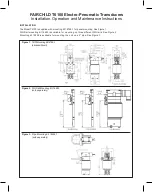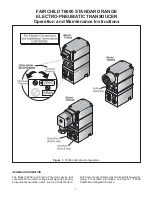
FCC ID: K6610444140
IC ID: 511B-10444140
Alignment
3/5
Vertex Standard Co., Ltd.
Alignment Preparation & Precautions
A dummy load and inline wattmeter must be connected to the main antenna jack in all procedures that
call for transmission, except where specified otherwise. Correct alignment is not possible with an
antenna. After completing one step, read the following step to determine whether the same test
equipment will be required. If not, remove the test equipment (except dummy load and wattmeter, if
connected) before proceeding.
Correct alignment requires that the ambient temperature be the same as that of the transceiver and
test equipment, and that this temperature be held constant between 20 and 30 °C (68 and 86 °F).
When the transceiver is brought into the shop from hot or cold air it should be allowed some time for
thermal equalization with the environment before alignment. If possible, alignments should be made
with oscillator shields and circuit boards firmly affixed in place. Also, the test equipment must be
thoroughly warmed up before beginning.
Before beginning, connect the transceiver and PC using the VPL-1 programming cable as described in
the EEPROM Programming chapter, and downloads the EEPROM data from the transceiver to the
computer.
Store this data in a disk file so that it can be saved and retrieved later. Using the table below, program
the channel, CTCSS, and DCS alignment settings for your transceiver version. Upload this file to the
transceiver.
Note: Signal levels in dB referred to in this procedure are based on 0 dBm = 0.5 µV (closed circuit).
Caution:
Do not connect this line to ground, and be certain that the speaker has adequate
capability to handle the audio output from the radio.
Because of the bridge audio amplifier circuit used in the radio, it is necessary to construct and
use a simple audio load test adapter as shown in the schematic diagram above, when conducting
receiver alignment steps.
3.5
φ
PLUG
Attenuated
Test Output (1/2)
2
Ω
10 W
Ground
+ 470 µF
2
Ω
10 W
AF Test Adapter Schematic























